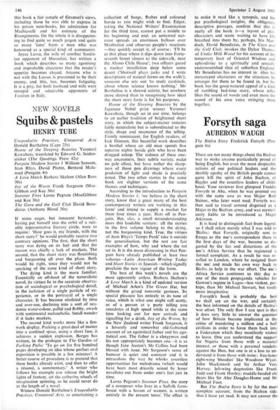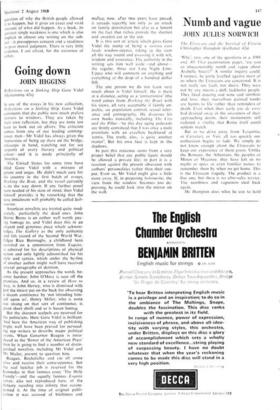Forsyth saga
AUBERON WAUGH The Biafra Story Frederick Forsyth (Pen- guin 6s)
There are not many things about the Biafran war to make anyone particularly proud of being English, but even the most despicable actions of our political leaders and the deathly apathy of the British people cannot
quite kill the spirit of John Buchan, of Biggles and the countless leaders of child- hood. Your reviewer first glimpsed Freddie Forsyth in Aba, when he was pointed out with the same awe as was Major Rolf Steiner, who later went mad. Forsyth was then said to travel around disguised as a Major in the Biafran army, and was mysteri- ously liable to be introduced as Major Atkinson.
It is hard to distinguish fact from legend, so I shall relate merely what I was told in Biafra: that Forsyth, originally sent to Enugu as the BBC's correspondent there in the first days of the war, became so dis- gusted by the lies and distortions of the BBC'S Africa Service that he registered a formal complaint. As a result he was re- called to London, where he resigned from the BBC and made his own way back to Biafra to help in the war effort. The sac's Africa Service continues to this day as one of the main propaganda vehicles for Gowon's regime in Lagos—less violent, per- hgps, than Mr Michael Stewart, but vastly more imaginative.
Forsyth's book is probably the best we shall see on the war, and certainly the best informed on the details of Biafra's war effort. The only flaw I can spot is that it does very little to answer the question of how Britain became implicated in the crime of murdering a million and a half civilians in order to force them back into a Federation which they manifestly wished to leave. One can understand the support for Nigeria from those with a material interest. or those with a personal vendetta against the Ibos, but one is at a loss to un- derstand it from those with none: free-lance right-wing 'bloodies' like Woodrow Wyatt. John Mackintosh and Sir Arthur Verc Harvey; left-wing dogmatists like Frank Judd and Frank Hooley; muddle-headed old dears like Sir Alec Douglas-Home and Mr Michael Foot.
But The Biafra Story is by far the most complete account, from the Biafran side. that I have yet read. It may not answer the question of why the British people allowed it to happen, but it gives an exact and vivid account of what did happen. As a book, its greatest single weakness is one which is also implicit in almost any writing on the sub- ject----it presupposes concern and a readiness to pass moral judgment. There is very little evidence, 1 am afraid, for the existence of either.



































 Previous page
Previous page